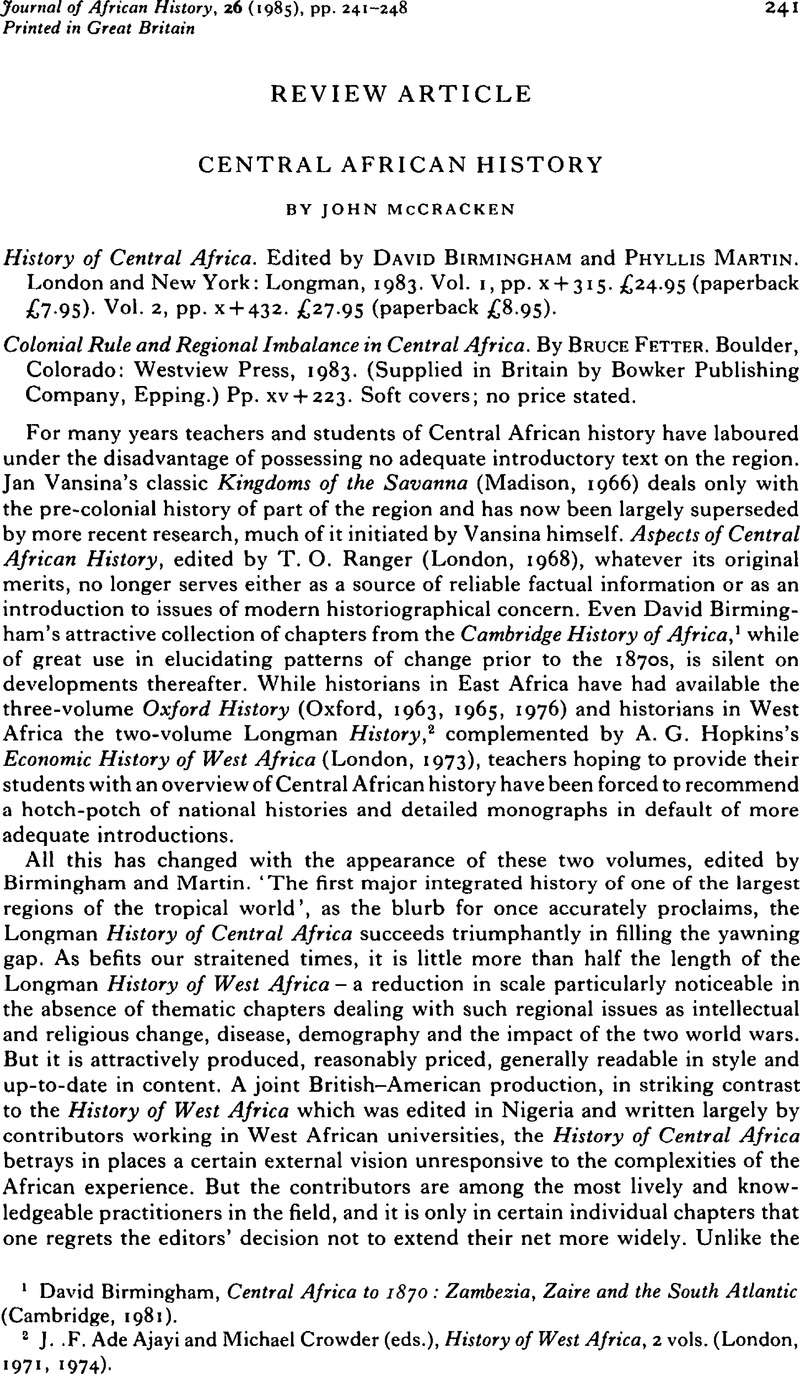No CrossRef data available.
Published online by Cambridge University Press: 22 January 2009

1 Birmingham, David, Central Africa to 1870: Zambezia, Zaire and the South Atlantic (Cambridge, 1981).Google Scholar
2 Ade Ajayi, J. F. and Crowder, Michael (eds.), History of West Africa, 2 vols. (London, 1971, 1974).Google Scholar
3 Tosh, John, ‘Lango agriculture during the early colonial period: land and labour in a cash-crop economy, J. Afr. Hist., xix, 3 (1978), 417.Google Scholar See also Tosh, John, ‘The cash-crop revolution in tropical Africa’, African Affairs, LXXIX, no. 314 (1980), 79–94.CrossRefGoogle Scholar
4 McCracken, John, ‘Experts and expertise in colonial Malawi’, African Affairs LXXXI, no. 322 (1982), at 105–10.Google Scholar See also Iliffe, John, A Modern History of Tanganyika (Cambridge, 1979), 315–16, 472–4.CrossRefGoogle Scholar
5 McCracken, John, ‘Planters, peasants and the colonial state: the impact of the Native Tobacco Board in the Central Province of Malawi’, J. Southern African Studies ix, 2 (1983), 172–92CrossRefGoogle Scholar; Kettlewell, R. W., ‘Agricultural change in Nyasaland: 1945-1960’. Food Research Institute Studies, V (1965), 220–85.Google Scholar
6 Mandala, Elias Coutinho, ‘Capitalism, ecology and society: the Lower Tchiri (Shire) Valley of Malawi, 1860-1960’ (Ph.D. thesis, University of Minnesota, 1983), 5-7, 183–212.Google Scholar
7 Saul, John S., ‘Nationalism, socialism and Tanzanian history’, in Cliffe, Lionel and Saul, John S. (eds.), Socialism in Tanzania, I: Politics (Dar es Salaam, 1972), 6Google Scholar
8 van Binsbergen, Wim M.J., Religious Change in Zambia: Exploratory Studies (London, 1981).Google Scholar
9 Leroy Vail, E. g., ‘Ethnicity, language and national unity: the case of Malawi’, in Bonner, P. L. (ed.), Working Papers on Southern African Studies, 11 (Johannesburg, 1977), 121–63Google Scholar; Ranger, Terence, ‘European attitudes and African realities: the rise and fall of the Matola chiefs of south-east Tanzania’, J. Afr. Hist, xx, 1 (1979), 63–82CrossRefGoogle Scholar; Phimister, Ian and Van Onselen, Charles, ‘The political economy of tribal animosity: a case study of the 1929 Bulawayo location “faction fight”’, J. Southern African Studies vi, 1 (1979), 1–4.CrossRefGoogle Scholar
10 Quoted in Ranger, T. O., The African Voice in Southern Rhodesia, 1898-1930 (London, 1970), 225.Google Scholar
11 van Onselen, Charles, Chibaro (London, 1976), 74–127Google Scholar. It should be stressed that van Onselen's analysis is a great deal more subtle than that of some of his followers.
12 For introductions to some of these issues as they relate to Central Africa see van Onselen, Charles, ‘Collaborators in the Rhodesian mining industry’, African Affairs, LXXII, no. 289 (1973), 401–18CrossRefGoogle Scholar; Ranger, Terence, ‘Making Northern Rhodesia imperial: variations on a royal theme, 1924-1938’, African Affairs, LXXIX, no. 316 (1980) 349–73CrossRefGoogle Scholar; McCracken, John, ‘Coercion and control in Nyasaland: aspects of the history of a colonial police force’, seminar on Comparative Commonwealth History: Crime, Deviance and Social Control: Institute of Commonwealth Studies, University of London, 6 11. 1984.Google Scholar
13 Read, Margaret, ‘Migrant labour in Africa and its effects on tribal life.’ International Labour Review, XLV, 6 (1942), 622.Google Scholar